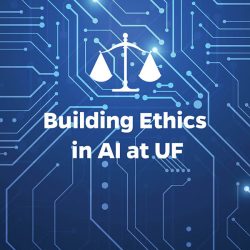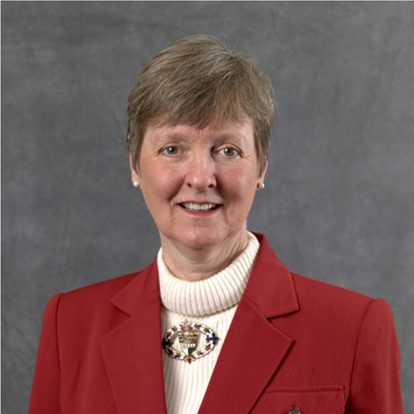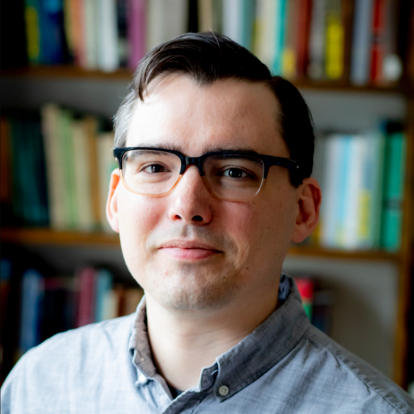
- This event has passed.
Building Ethics in AI at UF
April 28, 2023 @ 9:30 am - 1:00 pm

In 2022, the University of Florida became a signatory to the Rome Call for AI Ethics. By signing the Rome Call, UF committed to doing its part to promote ethical AI. But what does a commitment to ethical AI mean for researchers and teachers at the University of Florida? To begin to answer this question, a panel of UF experts will lead audience members through discussions about core AI values identified in the Rome Call and what it might mean to incorporate those values into AI research and teaching.
This event is sponsored by the AI² Center at UF. It will be held in the Reitz Union Chamber Room, and also on Zoom. Registration is required (Zoom information is provided in the registration process).
Panelists
Barbara Evans (Levin College of Law)
David Grant (Department of Philosophy)
Jim Hoover (Warrington College of Business)
Duncan Purves (Department of Philosophy)
My Thai (Department of Computer and Information Science and Engineering)
Schedule
9:30am – 10:00am: Coffee and refreshments
10:00am – 10:10am: Welcome and Introduction (David Reed and Duncan Purves)
10:15am – 10:55am: Impartiality and Inclusion (Duncan Purves)
11:00am – 11:40am: Transparency, Explainability, and Interpretability (Jim Hoover, David Grant)
11:45am – 12:25pm: Privacy and Data Security in UF AI Research (Barbara Evans, My Thai)
12:30pm – 1:00pm: Building an AI Ethics Infrastructure at UF (all panelists)
Each session will begin with a 5-10 minute primer (delivered by the session leaders) followed by 25-30 minutes of moderated discussion.
About the Participants
Panelist: Barbara J. Evans is a Professor of Law and Stephen C. O’Connell Chair at the University of Florida Levin College of Law and Professor of Engineering at the University of Florida Herbert Wertheim College of Engineering. She specializes in artificial intelligence, data privacy and access, ethics and regulation of artificial intelligence and machine learning medical software. Professor Evans has published widely on these topics in law journals and peer-reviewed scientific, medical, and ethics journals, including the New England Journal of Medicine, Science, Nature Medicine, American Journal of Bioethics, Genetics in Medicine, American Journal of Human Genetics, Clinical Pharmacology & Therapeutics, and Journal of the American Medical Informatics Association.
is a Professor of Law and Stephen C. O’Connell Chair at the University of Florida Levin College of Law and Professor of Engineering at the University of Florida Herbert Wertheim College of Engineering. She specializes in artificial intelligence, data privacy and access, ethics and regulation of artificial intelligence and machine learning medical software. Professor Evans has published widely on these topics in law journals and peer-reviewed scientific, medical, and ethics journals, including the New England Journal of Medicine, Science, Nature Medicine, American Journal of Bioethics, Genetics in Medicine, American Journal of Human Genetics, Clinical Pharmacology & Therapeutics, and Journal of the American Medical Informatics Association.
Panelist: David Gray Grant  is an Assistant Professor in the Department of Philosophy at the University of Florida and a Senior Research Fellow in Digital Ethics and Governance at the Jain Family Institute. He works mainly in ethics of technology (especially ethics of artificial intelligence) and philosophy of science (especially computer and data science). His research focuses on philosophical issues raised by automated decision-making systems and autonomous software agents. Before coming to UF, David was a Postdoctoral Fellow at Harvard University, where he ran the Embedded EthiCS Teaching Lab as part of his work with the Embedded EthiCS @ Harvard program. The program is a joint effort between the philosophy and computer science departments, and develops ethics modules for courses across the computer science curriculum. David completed his Ph.D. in Philosophy at MIT in 2018.
is an Assistant Professor in the Department of Philosophy at the University of Florida and a Senior Research Fellow in Digital Ethics and Governance at the Jain Family Institute. He works mainly in ethics of technology (especially ethics of artificial intelligence) and philosophy of science (especially computer and data science). His research focuses on philosophical issues raised by automated decision-making systems and autonomous software agents. Before coming to UF, David was a Postdoctoral Fellow at Harvard University, where he ran the Embedded EthiCS Teaching Lab as part of his work with the Embedded EthiCS @ Harvard program. The program is a joint effort between the philosophy and computer science departments, and develops ethics modules for courses across the computer science curriculum. David completed his Ph.D. in Philosophy at MIT in 2018.
 Panelist: Jim Hoover is a professor and researcher in the Warrington College of Business at the University of Florida. He teaches applications of AI across multiple functional disciplines in business, but is especially focused on Marketing. Marketing has embraced AI as a key differentiator in business performance. But AI challenges such as biased outcomes and privacy concerns are important areas for business and marketing practitioners to address. Jim’s current research focus is on mitigating bias in AI resulting from the data inputs to AI models.
Panelist: Jim Hoover is a professor and researcher in the Warrington College of Business at the University of Florida. He teaches applications of AI across multiple functional disciplines in business, but is especially focused on Marketing. Marketing has embraced AI as a key differentiator in business performance. But AI challenges such as biased outcomes and privacy concerns are important areas for business and marketing practitioners to address. Jim’s current research focus is on mitigating bias in AI resulting from the data inputs to AI models.
Panelist: Duncan Purves is an associate professor in the Department of Philosophy at the University of Florida. He specializes in ethics, especially questions of fairness and trust in artificially intelligent systems. His past work was on so-called ‘autonomous weapons systems,’ weapons which can target enemies without human oversight. He now has an NSF grant to investigate the ethical dimensions of predictive policing algorithms, which are being used to identify places and people at highest risk of crime.
is an associate professor in the Department of Philosophy at the University of Florida. He specializes in ethics, especially questions of fairness and trust in artificially intelligent systems. His past work was on so-called ‘autonomous weapons systems,’ weapons which can target enemies without human oversight. He now has an NSF grant to investigate the ethical dimensions of predictive policing algorithms, which are being used to identify places and people at highest risk of crime.
Panelist: My T. Thai  is a UF Research Foundation Professor of Computer & Information Sciences & Engineering and Associate Director of Nelms Institute for the Connected World at the University of Florida. She is a Fellow of IEEE. Dr. Thai has extensive expertise in trustworthy AI, billion-scale data mining, and optimization, especially for complex graph data with applications to blockchain, social media, critical networking infrastructure, cybersecurity, and healthcare. The results of her work have led to 7 books and 300+ publications in leading academic journals and conferences, including 2014 IEEE MSN Best Paper Award, 2017 IEEE ICDM Best Papers Award, 2018 IEEE/ACM ASONAM Best Paper Runner Up, and 2023 AAAI Distinguished Paper Award.
is a UF Research Foundation Professor of Computer & Information Sciences & Engineering and Associate Director of Nelms Institute for the Connected World at the University of Florida. She is a Fellow of IEEE. Dr. Thai has extensive expertise in trustworthy AI, billion-scale data mining, and optimization, especially for complex graph data with applications to blockchain, social media, critical networking infrastructure, cybersecurity, and healthcare. The results of her work have led to 7 books and 300+ publications in leading academic journals and conferences, including 2014 IEEE MSN Best Paper Award, 2017 IEEE ICDM Best Papers Award, 2018 IEEE/ACM ASONAM Best Paper Runner Up, and 2023 AAAI Distinguished Paper Award.
Moderator: Juan Claudio Nino  , Ph.D., is a Professor in the Materials Science and Engineering Department at University of Florida. He is an expert in electronic materials and within the world of artificial intelligence (AI), his research includes the design and manufacturing of neuromorphic devices and related hardware for machine learning and AI applications. He is also working on the use of AI for the early detection of neurodegenerative diseases like Alzheimer’s disease. Prof. Nino serves in the Emerging Technologies Technical Advisory Committee of the US Department of Commerce which focuses on the state of technologies such as AI and projecting their likely effects in the future on national security, the U.S. defense industrial base, and the overall health and competitiveness of the U.S. economy.
, Ph.D., is a Professor in the Materials Science and Engineering Department at University of Florida. He is an expert in electronic materials and within the world of artificial intelligence (AI), his research includes the design and manufacturing of neuromorphic devices and related hardware for machine learning and AI applications. He is also working on the use of AI for the early detection of neurodegenerative diseases like Alzheimer’s disease. Prof. Nino serves in the Emerging Technologies Technical Advisory Committee of the US Department of Commerce which focuses on the state of technologies such as AI and projecting their likely effects in the future on national security, the U.S. defense industrial base, and the overall health and competitiveness of the U.S. economy.